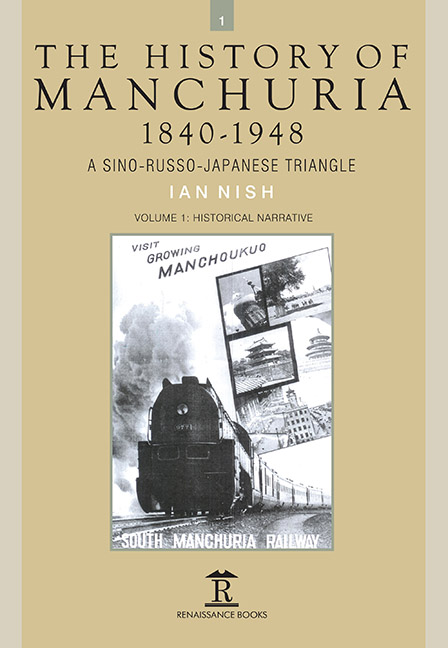Book contents
- Frontmatter
- Dedication
- Contents
- Preface
- Acknowledgements
- Name Conventions
- List of Abbreviations
- List of Maps
- Chapter One Manchuria and Russian Ambition, 1840s–1890s
- Chapter Two Sino-Japanese War and After, 1894–1900
- Chapter Three Prelude to the Russo-Japanese War, 1900–1905
- Chapter Four Railways, Reforms and Revolutions, 1906–1914
- Chapter Five Wartime Turmoil in Manchuria, 1915–1922
- Chapter Six Chang Tso-Lin’s Manchuria, 1922–28
- Chapter Seven Chinese Nationalism and Foreign Railways, 1929–1931
- Chapter Eight Lytton Commission in Manchuria, 1931–1932
- Chapter Nine Manchukuo: From Republic to Empire, 1933–1937
- Chapter Ten A Decade of Wars, 1938–1948
- Epilogue
- Map
- Select Bibliography
- Index
- Volume 2: Select Primary Sources
- Miscellaneous Frontmatter
- Dedication
- Miscellaneous Frontmatter
- Chapter 1 1840–1894
- Chapter 2 1895–1899
- Chapter 3 1900–1905
- Chapter 4 1905–1914
- Chapter 5 1915–1922
- Chapter 6 1922–1928
- Chapter 7 1929–1931
- Chapter 8 1931–1932
- Chapter 9 1933–1937
- Chapter 10 1938–1948
- Apendix Appeal by the Chinese Government
Chapter One - Manchuria and Russian Ambition, 1840s–1890s
Published online by Cambridge University Press: 18 November 2023
- Frontmatter
- Dedication
- Contents
- Preface
- Acknowledgements
- Name Conventions
- List of Abbreviations
- List of Maps
- Chapter One Manchuria and Russian Ambition, 1840s–1890s
- Chapter Two Sino-Japanese War and After, 1894–1900
- Chapter Three Prelude to the Russo-Japanese War, 1900–1905
- Chapter Four Railways, Reforms and Revolutions, 1906–1914
- Chapter Five Wartime Turmoil in Manchuria, 1915–1922
- Chapter Six Chang Tso-Lin’s Manchuria, 1922–28
- Chapter Seven Chinese Nationalism and Foreign Railways, 1929–1931
- Chapter Eight Lytton Commission in Manchuria, 1931–1932
- Chapter Nine Manchukuo: From Republic to Empire, 1933–1937
- Chapter Ten A Decade of Wars, 1938–1948
- Epilogue
- Map
- Select Bibliography
- Index
- Volume 2: Select Primary Sources
- Miscellaneous Frontmatter
- Dedication
- Miscellaneous Frontmatter
- Chapter 1 1840–1894
- Chapter 2 1895–1899
- Chapter 3 1900–1905
- Chapter 4 1905–1914
- Chapter 5 1915–1922
- Chapter 6 1922–1928
- Chapter 7 1929–1931
- Chapter 8 1931–1932
- Chapter 9 1933–1937
- Chapter 10 1938–1948
- Apendix Appeal by the Chinese Government
Summary
AT THE TURN of the 1930s ‘Manchuria’ was headline news. By its geographical location it was one of those intermediate points in the world where international rivalries can so easily be aroused and crises sparked which can only be resolved with extreme difficulty. Scholars have observed this. Owen Lattimore, who had studied the country from its ancient tribal beginnings, described Manchuria as the ‘Cradle of Conflict’. Sherwood Eddy who was in Mukden when the Manchurian Crisis broke out in September 1931 described Manchuria as ‘The World’s Danger Zone’.
This book is written from the standpoint that Manchuria is part of China. What is known in this work as ‘Manchuria’ is described by the Chinese as the Three Eastern Provinces or its Northeastern Provinces; and the Nationalist Government of the 1920s had no hesitation in claiming that it exercised sovereignty there. The Japanese in the 1920s took a contrary view.It would be wrong to suggest that there was a representative Japanese view about Manchuria. But the following extract will show how some Japanese viewed the Manchurian thinking after 1931:
Manchuria, formerly part of China but since the revolution of 1911… a semi-independent state governed by warlords, determined to stand forth as an independent nation and at long last to cut adrift from the regime of exploitation.
This is an illustration of the view which Mr Ohara as a correspondent of The Manchurian Daily News was publishing in Mukden. The paper argued that ‘Manchuria’ was a recent creation; that Chinese in Manchuria came from North China on a seasonal basis and commonly returned to their homes; that Manchus were being neglected and wanted independence both from warlords and from the Chinese government at Nanking. These conflicting interpretations of the history and thinking of Manchurians were to sour relations between China and Japan. But it was only one aspect of Manchuria’s complex and interesting history.
In this book I take up the story when the intrusion of foreign countries and their nationals prompts the Chinese to tighten their relationships with remoter outposts of their Middle Kingdom. By the use of modern armies and navies these outsiders negotiated Western-style treaties – something with which the Chinese were not familiar.
- Type
- Chapter
- Information
- The History of Manchuria, 1840-1948A Sino-Russo-Japanese Triangle, pp. 1 - 20Publisher: Amsterdam University PressPrint publication year: 2016



